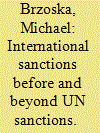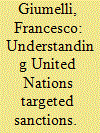|
|
|
Sort Order |
|
|
|
Items / Page
|
|
|
|
|
|
|
| Srl | Item |
| 1 |
ID:
142433


|
|
|
|
|
| Summary/Abstract |
United Nations sanctions are authorized by the international body that is legally charged with the maintenance of international peace and security, the UN Security Council. They are grounded in provisions of the UN Charter. However, only a fraction of all international sanctions are mandated by the UN. One of the findings of this article, which is based on data collected by the Targeted Sanctions Consortium (TSC), is that the large majority of UN sanctions are preceded by non-UN sanctions, particularly sanctions by the United States and the European Union. Furthermore, it is common practice, particularly by the US and the EU, to add sanction provisions of their own to UN sanctions. As a result, for most UN sanctions, there are also non-UN sanctions against the same targets. Such combined sanction regimes add restrictions imposed by only some governments to those that all countries have to implement. Combined sanction regimes are therefore potentially more effective in achieving the targeted outcome than UN sanctions, which represent the lowest common denominator achievable among the members of the UN Security Council. On the other hand, combined sanction regimes might suffer from a type of ‘sanctions fatigue’. A growing number of states outside of the West are openly opposed to unilateral sanctions. Adding non-UN sanctions to UN sanctions might reduce their willingness to support UN sanctions. The TSC data, however, does not support such a contention. Rather, the data indicates that combined sanction regimes are more effective than stand-alone UN sanctions. Still, the US and EU governments—as the main drivers of sanctions policy in general and UN sanctions in particular—need to be aware of this criticism in order not to unwittingly undermine the UN sanctions instrument.
|
|
|
|
|
|
|
|
|
|
|
|
|
|
|
|
| 2 |
ID:
142434


|
|
|
|
|
| Summary/Abstract |
United Nations sanctions have undergone profound transformations in the past two decades. In 1990, the UN Security Council imposed a general, comprehensive embargo on Iraq after its invasion of Kuwait. In 2015, there are 16 Sanctions Committees managing regimes that have little in common with the one imposed against Iraq in 1990. The measures imposed against Iraq were comprehensive, covering all goods coming in and out of the country, while sanctions imposed today are mostly against individuals, non-state entities and are more limited in scope. This article aims to provide empirical and systematic evidence of some of the distinctive qualities of UN targeted sanctions. The analysis identifies three distinctive characteristics of targeted sanctions. First, targeting individuals and non-state actors has permitted the use of sanctions in a wider range of crisis types. Second, the targets of sanctions are substantially different from comprehensive sanctions. Third, the form taken by sanctions is substantially different today from the trade embargoes imposed in the past. The author concludes that the Security Council should devote special attention to the designing and implementation phases of sanctions. The article makes use of the new database prepared by the Targeted Sanctions Consortium (TSC), which includes all cases of UN targeted sanctions.
|
|
|
|
|
|
|
|
|
|
|
|
|
|
|
|
|
|
|
|
|